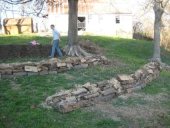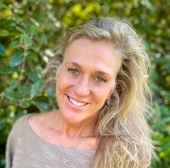
 1
1




"Also, just as you want men to do to you, do the same way to them" (Luke 6:31)




 ...Welcome!
...Welcome!
I did not know 'wofati'...Curacao Island in (Caribbean, Netherlands' Antilles), I ask myself: would this be possible there?
I don't know if the trees growing there (at the South side of the hilly ridge) are right for the needed wood.
What do you (all) think, do you have other ideas, things I forgot maybe?










"Also, just as you want men to do to you, do the same way to them" (Luke 6:31)














"Also, just as you want men to do to you, do the same way to them" (Luke 6:31)
 2
2




Rick Valley at Julie's Farm




 1
1




 1
1




Rick Valley at Julie's Farm










Rick Valley wrote:... Any bamboo you could grow would be a good building material, find the best variety you can. Hard to find clay for natural building unless you're on a big island. As long as you plan your drainage, roof slope and building anchoring to withstand hurricane force winds and 1 inch per hour rainfalls (to 20 in/24 hours, you'll probably have a house when it's over. Thatch is safer than tin roofs which can turn into flying machetes, but they need frequent replacement, and coconut palm is just OK, not the best thatch. It's a challenge, and sea level change will raise havoc with all the islands and coasts. Best to build light with high peak roofs and covering that blows away leaving the structure standing. Design to funnel in the trade winds, plant shade and food at the same time. Nurture the marine fauna with sanctuaries and re-establish the abundance of 1500 AD, and use that fertility to nurture the land.
"Also, just as you want men to do to you, do the same way to them" (Luke 6:31)




Rick Valley at Julie's Farm










Rick Valley wrote:That is really good that there's a diversity of geology on Curacao: that makes things MUCH easier. There are two English words I have tried to eliminate from my vocabulary; "nature" which when used I believe encourages us to see ourselves as SEPARATE and "invasive" which more than the word weedy encourages us to shift into "MUST MAKE WAR ON THE ENEMY" mode which declares that "all is fair in war" and suspend the usual moral judgement and all other logical thought. I would think there is bamboo native on Curacao, certainly there is Bambusa vulgaris and some of it's forms since it is the easiest tropical to propagate and is everywhere in the tropics I have been around the world. But Bambusa vulgaris is not a very useful bamboo- not strong primarily- the best use for it is as banana props- but there are probably others. Why would bamboo be "invasive" if it is part of a culture? No one where bamboo is native worries about this "invasive" concept because they are too busy using bamboo for food, fiber, construction, cooking containers and so on. The number 1 consumer of bamboo on the planet is humans.
The proper approach would be to look around and see if any likely bamboo is available and use it if it's close enough to be used (and not already in full use) or if not close enough, transplant some to the proper place in your project and get it established. In any case, MANY (maybe most) of the bamboo species in the tropics are not running bamboos, and so meet the criteria of not being invasive in any case. (Excuse the riff, but bambusaphobia must be fought harder than any invasive species)
So- what IS the soil type you are working with? Am I right to assume that the site is on limestone bedrock- I presume a "carbonate platform" with the volcanics and such in the interior of the island? One problem I have with the forums is that nearly everyone just states a problem and asks for a solution.
But back to your situation: how close to the salt water are you? What elevation above sea level? Have you got your list of available pioneer woody plants? Are there any useful cacti present, which could be good for the semi-arid climate? I recognize that most of the islands historically were managed for production of cash crops like sugar, and so there isn't the sort of diversity in the flora that there could be, but have you tapped into what there is? Historically, did the Dutch ever bring many Indonesian cultivars in? If so there could be things that aren't in the Spanish lands.
Coconut palm is a really good species; hopefully there is some genetic diversity available, but often in the Caribbean there isn't. There may be other palms available which are better for thatch, and you could keep an eye out for them.
 So I can't answer those questions.
So I can't answer those questions.
 The Dutch did not bring many things in. In Indonesia all spices were growing much better, so there was no reason to bring them to the Antilles. Curaçao was mainly a port for the slave-trade. People from Africa were brought there and then sold to (mostly) North America
The Dutch did not bring many things in. In Indonesia all spices were growing much better, so there was no reason to bring them to the Antilles. Curaçao was mainly a port for the slave-trade. People from Africa were brought there and then sold to (mostly) North America  Black page in the Dutch history
Black page in the Dutch history 
"Also, just as you want men to do to you, do the same way to them" (Luke 6:31)
 1
1




Rick Valley at Julie's Farm










 I am glad my in-law-family accepts me as who I am, but myself I sometimes feel sorry for being Dutch. I do not want to make the mistakes some other Dutch people living on the island still make, the same their ancestors made.
I am glad my in-law-family accepts me as who I am, but myself I sometimes feel sorry for being Dutch. I do not want to make the mistakes some other Dutch people living on the island still make, the same their ancestors made. "Also, just as you want men to do to you, do the same way to them" (Luke 6:31)











"Also, just as you want men to do to you, do the same way to them" (Luke 6:31)
 1
1















 I am improving my 'social skills' too doing cleaning work for elderly and handicapped people.
I am improving my 'social skills' too doing cleaning work for elderly and handicapped people.
"Also, just as you want men to do to you, do the same way to them" (Luke 6:31)










 ). We are going to talk about future plans (what I want and what they expect).
). We are going to talk about future plans (what I want and what they expect).

"Also, just as you want men to do to you, do the same way to them" (Luke 6:31)
 1
1














Bo Elzinga wrote: ... some friends want to start some kind of eco-friendly project on Curacao, with Aqua-ponics, for what they contacted me.
Read a few of your posts, and saw you already know about the diabase, the rock and mostly thin layer of dirt on top of it. So if you want deep soils, you will have to ship it in, or create it yourself, but, as it is the tropics, I guess the soils will not get very deep ? Anyway, with this given, swales and other ways to store water in the soil, seems like a not so productive way of water harvesting, I'd see if there could be ways of having a cistern or something like that, big ponds shaded by trees, fish in it to eat the mosquito-larvae. Another thing that comes with the shallow soil is the pipes for cooling ....
ALso, another way of agriculture that needs less water, like aquaponics or bioponics might be something to look into. Especially the use of grey water is something you'd want to look at.
About the coral used in building houses : I don 't know if that is still condoned, but if so, the coral tends to form "salt-roses" (zoutrozen) on the walls, because the salt in it attracts moisture from the air and the stucco swells and flakes off. I've seen this in old houses built by the dujtch.

... Then there is bamboo ofcourse ..... I'd try the woven bamboo sheets and cover them with cob, do some experiments with waterglass, kwark, that kind of stuff.
I was at Korsou 5 times in the last 12 years, in different times of year. It was different every time! The last rainy season was very rainy, so it looks lush now. But with the sun and wind it could become dry in a few months without rain ... Finding a way to catch and store the rainwater is the most important!I haven't been on Korsou for about 20 years. When I last was there, it was very dry, only thorny bushes. What I've seen lately on some pictures is very different. It looks pretty lush and way better.
Sure I hope we'll 'run into eachother' there! And wish you the best with your project tooAnyway, when you go there, we might run into each-other. Will probably be goin this year. Good luck on your project ;o)
Cheers !

"Also, just as you want men to do to you, do the same way to them" (Luke 6:31)











"Also, just as you want men to do to you, do the same way to them" (Luke 6:31)




Inge Leonora-den Ouden wrote:I am thinking of starting a new thread ... but is it really needed? Yes, probably it is. This thread has some disadvantages:
. it started with a question about a sort of wofati, since then I learned a lot more ...
. the title doesn't tell where this project is
. a new phase is starting now ...
So: if you are looking for news on 'permaculture at Curaçao', you'll find it in a topic with that title
How permies.com works
What is a Mother Tree ?










Burra Maluca wrote:... I can edit the title for you if you give me a better one.
"Also, just as you want men to do to you, do the same way to them" (Luke 6:31)

|
Don't count your weasels before they've popped. And now for a mulberry bush related tiny ad:
Looking for cold-climate growers to join a GOOF livestream panel (Missoula)
https://permies.com/t/369111/cold-climate-growers-join-GOOF
|







